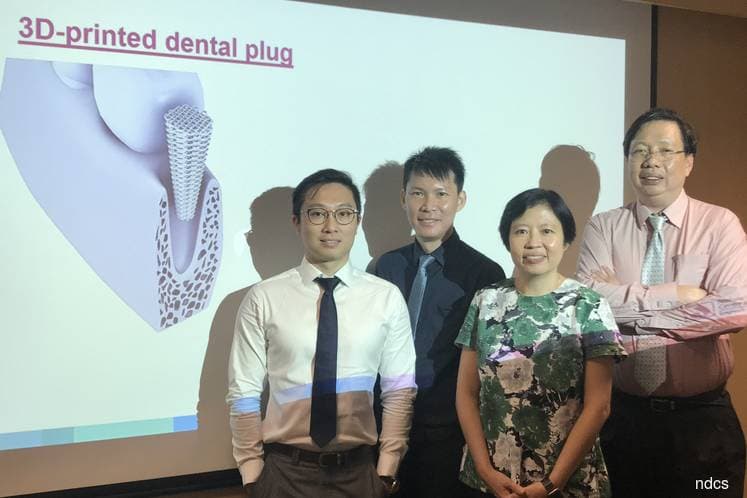
KUALA LUMPUR (July 8): The National Dental Centre Singapore (NDCS) has developed a second-generation bioresorbable 3D-printed dental plug that aims to improve the experience of patients who require dental implants.
In a joint statement, NDCS, together with Singapore Clinical Research Institute (SCRI) and Singaporean medical technology company and dental plug manufacturer Osteopore, said patients can benefit from having one less surgery procedure and a shorter treatment process, with the dental plug.
This is because the second-generation plug's composite material has been enhanced with tricalcium phosphate (TCP) to increase its bioactivity and shorten the time for it to degrade, allowing patients to have implants placed earlier, they said.
A randomised controlled clinical trial to evaluate the use of these dental plugs is now open for participant recruitment.
The clinical trial will evaluate the differences in alveolar ridge resorption after insertion of the dental plug, as opposed to tooth sockets without a dental plug.
The research team will also assess healing and inflammatory responses, and whether the enhanced plug improves bone density, which may increase the stability of dental implants.
If the enhanced dental plugs prove to be successful, patients needing dental implants can benefit from a shorter and less painful treatment process, as the plugs are placed immediately after extraction, and an additional bone graft surgery may be obviated, the statement read.
"We are continually looking for ways to collaborate with bioengineers and the medtech industry to co-develop innovative and value-based solutions that can be translated to better treatments and outcomes," NDCS director of research and education, Clinical Associate Professor Goh Bee Tin said, who is leading the trial.
"If successful, the bioresorbable 3D-printed dental plug will significantly improve the experience of patients who need dental implants," she added.
Meanwhile, Osteopore Chief Technology Officer Dr Lim Jing said the easy to use implants could also save significant operative time for dental surgeons and deliver quality bone regeneration.
"Osteopore International is pleased to collaborate with the strong clinical research teams of NDCS and SCRI to validate the clinical efficacy of our second generation regenerative technologies in dental socket preservation," he said.
"In this landmark research project where we are studying this new treatment option to our patients, the SCRI team is proud to work hand in hand with the clinical team from NDCS and the product manufacturing team from Osteopore to enable this study to be done at the highest quality and we hope this project will eventually translate to a better treatment option for our patients in the future," added SCRI public health physician and chief executive officer Associate Professor Teoh Yee Leong.
The clinical trial is recruiting up to 138 patients until January 2020.